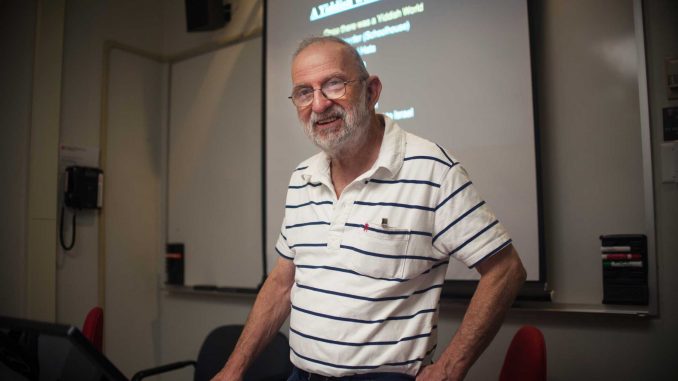
Mel Brooks and Woody Allen are serious subject matter in one course available to students.
For students in Hanoch Guy’s Jewish Humor class, those filmmakers become part of the curriculum.
“Being funny is subjective,” Guy said. “You have to surprise or shock the audience to be funny. Humor is an element of language that can bend into absurdity or contradiction. It is deeply connected to the soul and persecution of the Jewish people.”
Aaron Stevens, a senior media studies and production major, reminded students to not judge a book by its cover.
“People might think when they see Jewish Humor, the whole class will be about Jerry Seinfeld and Seth Rogan,” Stevens said. “It’s really more of a culture class. The humor is that since we have had 3,000 years of ignorance, we can get to the punch line before you.”
Stevens believes that taking Jewish Humor is worth the experience of being taught by Guy, rather than absorbing the content.
“He’s a great guy, very knowledgeable,” Stevens said. “A little long-winded, but come on, what professor isn’t?”
After he moved from Israel to Philadelphia at age 30, Guy pursued his Ph.D. in modern Hebrew poetry at the defunct Dropsie College. Although Guy applied to teach at the University of Pennsylvania as well as Temple, neither school responded to the budding poet at the time.
“Once I arrived to America, I got in touch with the chair of Temple Hebrew,” Guy said. “He invited me to teach an evening class without pay. Then I become an adjunct for Temple in 1971.”
Guy said more than 300 students were enrolled in the Hebrew program in 1973, which is astounding compared to the “16 or 17” students he noted who are currently enrolled in the Jewish studies program.
“The university cut down the major and the minor [last year], which was an arbitrary decision,” Guy said. “It was quite a shock because we weren’t asked, and now the department is a candidate for slow death. However, I don’t think it is particularly Hebrew. I think the language as a whole is no longer appreciated.”
Stevens was grateful that Jewish Humor was one class in the Jewish studies program to survive cancellation since he said it was one of the few avenues left for exploring his ancestry.
“I would highly recommend the class,” Stevens said. “If you’re trying to expand your knowledge of different ethnicities and challenge yourself, this is a great way to go. I know I learned a lot about my heritage.”
Matthew Doyen, senior history major, disagreed with Stevens.
“My friend suggested I take the class with him and assured me it would be a good time,” Doyen said. “Maybe it was because I’m not Jewish, but I definitely did not look forward to the 80 minute lecture. The only thing I remember is that what is funny is not always humorous.”
The curriculum consists of analyzing works of Hebrew humorists such as Mendele and Sholem Aleichem. Although frequent student chosen clips from YouTube are presented, Guy, an author of two books with a third on the way, maintains that the class is certainly writing intensive.
“Students realize the class is not about telling jokes,” Guy said. “From my own experience, people are a bit intimidated to tell jokes in front of the class. So the final project is a great win for the students because some of them actually stand up and try their hand.”
The final project allows complete creativity by encouraging students to demonstrate what they have learned through any medium they desire. “You are only limited by your imagination,” the syllabus states.
“Some of my favorite projects over the years include an interview with contemporary Jews such as Woody Allen [and] a tremendous biographical project on Lenny Bruce,” Guy said. “One time, a student did a dialogue with their grandmother, which was funny because she only spoke Yiddish.”
Stevens fondly recalls his final project as being similar.
“I wrote a two-page poem about having a Jewish mother,” Stevens said. “It was like if Phil Collins wrote a ballad about his mother. It was very stream of consciousness, but still funny because she would constantly butt in during the poem.”
Doyen was also inspired by a legendary singer for his project.
“I altered Billy Joel’s ‘We Didn’t Start the Fire’ to ‘We Didn’t Eat the Kosher,’” Doyen said. “I changed the lyrics to Jewish foods and celebrities and played the instrumental in the background.”
After more than 40 years of educating at Temple, Guy reveals why he continues to enlighten students on a subject that’s popularity has seen a sharp decline in recent years.
“I like the contact with the students,” Guy said. “From my first session, I tried to create trust between the class members so they can say whatever they want and be confident that nobody will laugh at them. Teaching has always been a wonderful experience for me and I may do it in the future, although I am getting a little tired.”
Despite his lukewarm review of the class, Doyen said that a roster without Guy would be bittersweet.
“[I think] he should retire soon, because he is too out of touch with the students,” Doyen said. “[But] I couldn’t imagine any other professor at Temple handling the course.”
John Corrigan can be reached at john.corrigan@temple.edu.


Be the first to comment